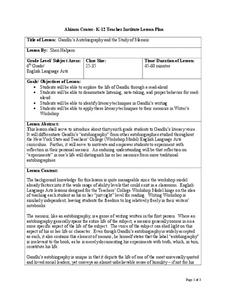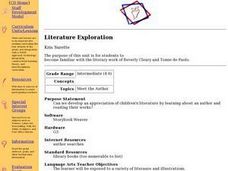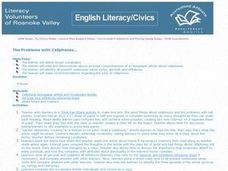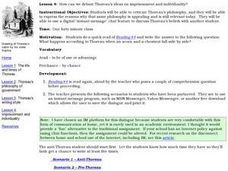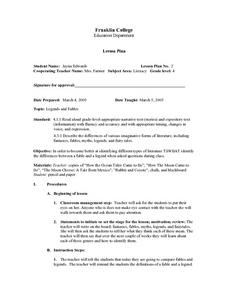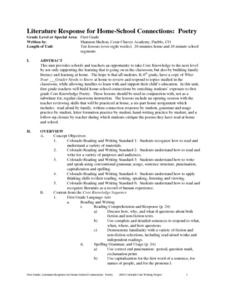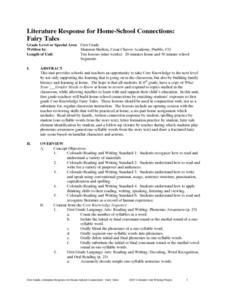Curated OER
Punctuation Takes a Vacation
Students review punctuation marks and their functions. They read a story, "Punctuation Takes a Vacation." Given flash cards of punctuation marks, students hold up the appropriate punctuation flash card during the story.
Curated OER
Gandhi's Autobiography and the Study of Memoir
Seventh graders explore the life of Gandhi using his autobiography and memoir. In this Gandhi exploration lesson, 7th graders analyze Gandhi's literary voice by reading his autobiography. Students identify literary techniques in Gandhi's...
Curated OER
Chapter 4 of The Secret School
Fourth graders read chapter 4 of The Secret School and answer discussion questions as they read. In this reading lesson plan, 4th graders also write a summary of what they read.
Curated OER
Cause and Effect
Third graders investigate cause and effect. In this cause and effect lesson, 3rd graders read a story and determine what are the causes and effects. Students match sentence strips to the make the correct cause and effect sentence....
Curated OER
Frederick Douglass
Learners read and illustrate a time line of Douglass's life and listen to an
excerpt of his diary describing his escape from slavery. They assemble with their pictures in chronological order around the classroom. In turn, they share...
Curated OER
The Witch of Goingsnake
Pupils complete literary analysis and writing activities using The Witch of Goingsnake. In this literary analysis lesson, students interpret a proverb, read poems, complete a quaker reading, and complete research for the lesson. Pupils...
Curated OER
Literature Exploration
Learners experience a variety of literature and illustrations. They read books by Beverly Cleary and tomie de Paolo. Using Storybook Weaber, students write their own autobiography. Learners give an oral report on their autobiography.
Curated OER
The War of 1812
Seventh graders investigate the War of 1812. In this early American history lesson, 7th graders read a handout about the war, watch video clips, and complete written exercises that complement the reading and video clips.
Curated OER
Adjectives in Poetry
Students read selected poems from the book Beast Feast, by Douglas Florian. They identify at least two to three keyword facts about each beast highlighted in the poems.
Curated OER
Slow and Steady Wins the Race
Students are introduced to the characteristics of fables. They read a fable by Aesop. In small groups, students identify fable characteristics present in Aesop's story and share their observations with the class.
Curated OER
The Problems With Cellphones
Learners read a news article about cell phones and identify continuous tense verbs, gerunds and infinitives in the article. They discuss cell phone use.
Curated OER
Personification
Fifth graders read opening pargraphs in their books and discuss with their peers the meaning of personification. They then identify three instances in the poem "Desert Tortoise" of similarities between humans and animals citing...
Curated OER
Every Living Thing
Learners read the book "Every Living Thing." They read one story at a time, and participate in various activities. Some of these activities include the following ideas: Students write about a time when they were in a similar situation as...
Curated OER
Good Citizenship and Philanthropy
Students discuss how to work together to solve community problems. In this community problems lesson plan, students discuss how their home, school, and community could benefit from group work and philanthropy. They read different...
Curated OER
Introduction to Philanthropy- Recognizing Good Citizenship and Philanthropy in Our Community
Students define philanthropy. In this community activity, students read A River Ran Wild and discuss the needs in the communities presented. Students discuss aspects of philanthropy in a community and brainstorm elements of a healthy...
Curated OER
Thoreau's Ideas on Imprisonement and Individuality
Students criticize Thoreau's philosophy about imprisonment and individuality. In this Thoreau analysis lesson, students read about Thoreau's philosophy and write an answer to the given questions. Students use a digital instant message...
Curated OER
Writing for Different Purposes and Audiences
Third graders explore how to write for different purposes and for a specific audience or person. They read, Where the Wild Things Are by Maurice Sendak. Students create a class book after reading the story. They each create their own...
Curated OER
The Underground Railroad
Fourth graders participate in a literature circle after reading a book about the Underground Railroad. They discuss their selected book with their literature circle group, and complete a handout about their role in the circle. Students...
Curated OER
Legends and Fables
Fourth graders identify and discuss the differences between legends and fables. They define fable and legend, then as a class take turns reading our books. Students select two of the stories, and complete a Venn diagram, comparing one...
Curated OER
Family Pictures
Pupils discuss family composition and traditions. After reading Family Pictures, students identify key vocabulary and cognates. Working in pairs, pupils discuss the people who compose their family and some traditions that are unique to...
Curated OER
Working Out Word Problems
Learners study word problems and learn to identify key words to solve the problems. In this word problems lesson, students role play as detectives to find key words in addition and subtraction word problems. Learners then create a poster...
Curated OER
Summary, Note Taking, Main Idea and Details
Pupils take notes from oral readings and lectures to create a summary of the material. They use different sizes of post-it notes to complete the activity. They practice pulling the main ideas out of the given material.
Curated OER
Literature Response for Home-School Connections: Poetry
First graders practice reading and writing for a variety of purposes and audiences. Ten lessons on one page.
Curated OER
Literature Response for Home-School Connections:
First graders explore learning skills that can be practiced at home in the ten lessons of this unit. Oral reading, letter formation, fairy tale identification, and phonic awareness exercises are provided in this unit.



